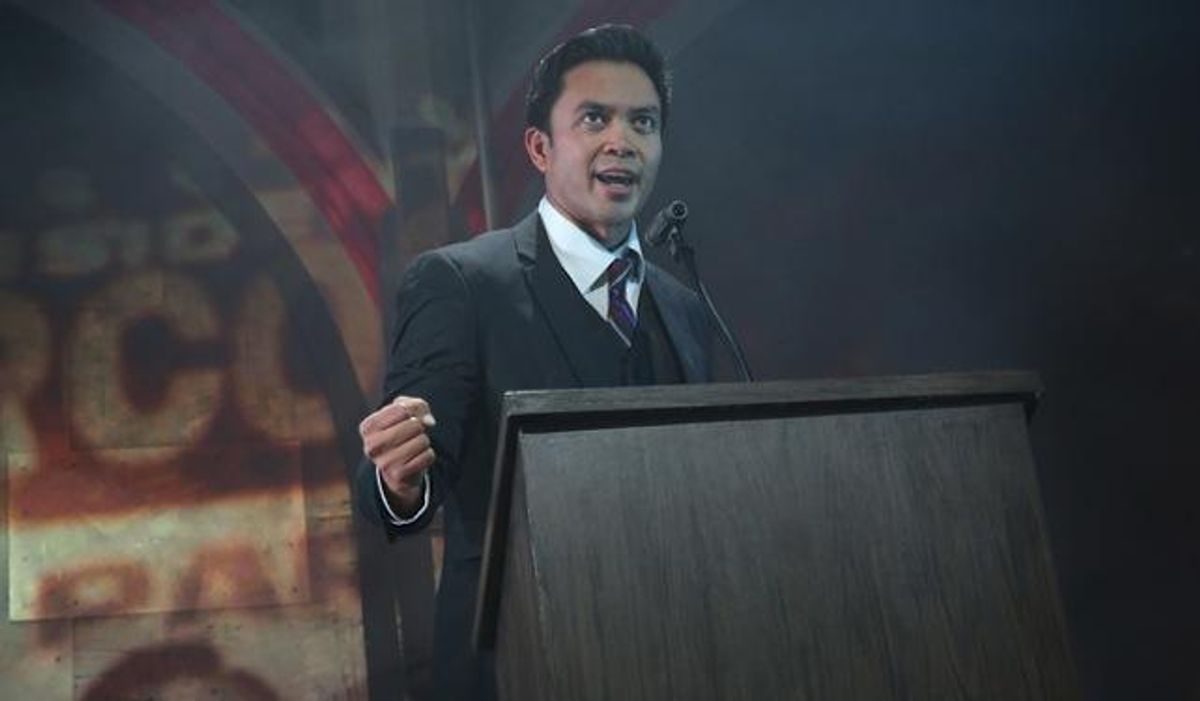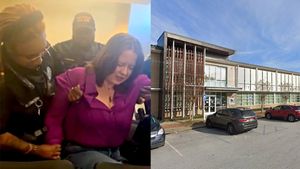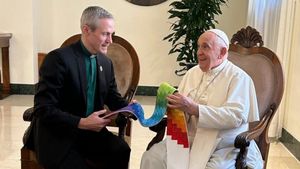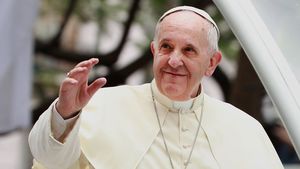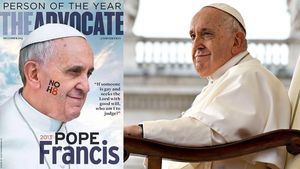Jose Llana in a scene from 'Here Lies Love' | Photo by Joan Marcus
Jose Llana, the actor who brings former Philippines president, Ferdinand Marcos, to life in Here Lies Love, the raucous and inventive pop opera by David Byrne of Talking Heads-fame, came out as a senior in high school--only to retreat back into the closet when he arrived on Broadway a few years later. "I got my first show on Broadway when I was a freshman in college, and suddenly I was thrust into a world where I was being cast in roles that were very masculine and sexual," he recalls. "It was very convenient for me, publically, to say that I was single--as with any young actors who are cast in leading or ingenue roles I was worried that if a casting director found out I was gay it would affect my ability to be cast."
SLIDESHOW | Jose Llana's Pride Photo Journal
That was in 1996 and, suffice to say, Llana has long surrendered his anxiety for pride. Today he is neither single, nor discreet. The success of Here Lies Love, a high-energy show in which the audience plays the role of the Filipino people--at first seduced, and then increasingly appalled, by the seductive, destructive Marcoses--has not gone unnoticed in The Philippines. "I've had interviews with magazines and newspapers in Manila, which is a whole different world of coming out," he says. "By proudly stating, as a matter of fact, that I have a partner of nine years whose name is Eric, I help chip away some of the prejudice in the Philippines."
Llana's parents, major activists in the fight against Ferdinand Marcos, left the country when Llana was three, in order to escape the repercussions of their opposition. Little did he imagine that he'd find himself playing the man who turned he and his parents into political exiles.
"I remember being interviewed for a now-defunct magazine called Theater Week when I was 19, and being asked where I saw myself in 10 or 15 years," he recalls. "I said I'd be very happy if was a working actor getting lead parts in original shows, but if you'd told me that one of those parts would be Filipino and give me an opportunity to tell a little about my country's history... it's a dream come true, and I'm not taking it for granted."
He shouldn't: Here Lies Love is one of the most enjoyable and energetic shows running in New York during a season full of enjoyable and energetic shows (the revivals of Hedwig and the Angry Inch and Cabaret spring to mind). Audience participation is not just encouraged; it is mandatory. Ushers in bright pink outfits direct the audience with glow sticks and then teach them relevant dance steps as the cast moves above, around, and frequently right through, the crowd. The set-up is not without risks. "Last summer I fell off the stage," recalls Llana. "Luckily I fell on a rather large guy--he was probably about 6'4", and built like a linebacker, and he was big enough for me to fall on and then to push me back on stage, and I sort of kept going."
As for playing a womanizing despot, Llana takes it as further evidence that society is changing for gay actors, an observation reinforced by the success of his friends Jesse Tyler Fergusson and Matt Bomer, both of whom he worked with before they were publicly out. "The misconceptions that an out actor can't play a certain part is being shattered every time another gay actor adds their name to the list of actors who have come out," he says.
It's for much same reason that Llana makes a point of celebrating New York's annual Pride parade. "I just think it's a really important thing to mark the achievements that have been happening these last couple of years because they are huge," he says. "It used to be that when you went out to celebrate Pride you'd just see a bunch of other gay people, but now Pride has turned into a party for everyone who support us, our friends and families. People who are growing up gay now are growing up in a community of other people their age who do not see being gay as a reason to be ostracized."
That social shift is reinforced by Llana's conversations with younger cast members who are also gay. "We share our stories of coming out, and they all came out in middle school and grade school, and that's becoming such a norm now--that's the generation that's going to push us over the finishing line."
One reason he feels New York's Pride celebrations are so important is the connection they represent to the Stonewall riots of 1969 that ignited the modern-gay gay rights movement. Last year, after New York's Supreme Court struck down the notorious Defense of Marriage Act, which had prevented same-sex marriages from receiving federal recognition, exuberant revelers chose to convene at The Stonewall Inn, cementing its status as a symbol of gay liberation. "I'm always happy and proud when I see young kids knowing a little more about gay history," Llana says, adding that it's impossible to discuss advances in equality without acknowledging the impact of AIDS, which mobilized the LGBT community to fight oppression. "Although AIDS is not over over, the generation coming up does not have to live with the same fear and stigma that we grew up with. Thankfully our community has become stronger as a result, and we've learned to rally together and not be ignored."
